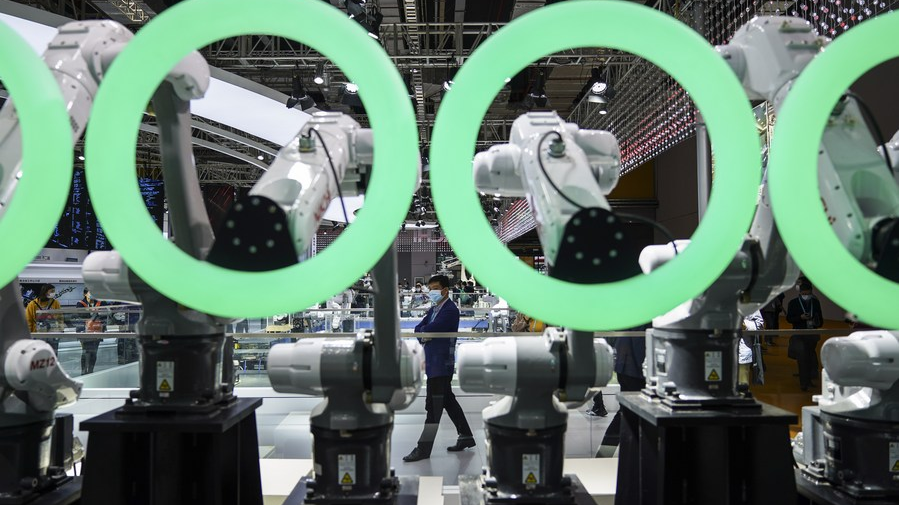By Yan Zeyang
In February, Chinese Foreign Minister Qin Gang and his Japanese counterpart Yoshimasa Hayashi held a telephone talk. The two sides reached an agreement on cooperation to "build a constructive and stable relationship" and strengthen "communication at all levels."
In line with the consensus reached by both sides, Hayashi is visiting China for two days from April 1. At the same time, there are still many challenges in the Sino-Japanese relationship, and there is a long way to go to make bilateral relations meet the requirements of the new era.
China-Japan relations face many negative factors
2023 marks the 45th anniversary of the signing of the Sino-Japanese Treaty of Peace and Friendship. Over the past 45 years, the China-Japan relations have made great progress overall.
However, in recent years, the security trust between China and Japan has retreated, and the "China threat" has become popular in Japan, posing challenges to the healthy development of Sino-Japanese relations.
In terms of historical issues, former Prime Minister Shinzo Abe visited the Yasukuni Shrine in December 2013. Since then, it has become a common practice for prime ministers to send offerings to the Yasukuni Shrine. Japanese militarism once caused serious harm to China, and it still hurts today. The Chinese people will never forget, and neither should Japan.
Regarding territorial issues, Japan has changed its previous practice and explicitly denied the existence of territorial disputes between the two countries, regardless of the consensus on shelving disputes established when the two countries normalized their diplomatic relations. Further, Japan's release of treated radioactive waste water into the Pacific Ocean may pose a threat to the environment and the health of people in neighboring countries including China.
Regarding the Taiwan question, Japanese politicians exaggerated the narrative of "Ukraine today, Taiwan tomorrow" to escalate tensions across the strait, and many congressmen visited China's Taiwan region.
Multiple considerations behind Japan
There may be multiple considerations behind Japan's recent negative China policy.
Japan has regarded China as an "imaginary enemy" and used the "China threat" to vigorously develop its own military power with the country's military power building constantly breaking through the bottom line. According to a plan announced by Prime Minister Fumio Kishida, Japan's defense expenditure will increase to 43 trillion yen (about $324 billion) from fiscal year 2023 to 2027. On February 28, the Japanese House of Representatives passed the 2023 budget. The Japanese government will also spend $1.55 billion to purchase the long-range Tomahawk cruise missile of the United States.
Further, Japan followed the U.S. to contain China. On March 31, the Japanese government announced that it plans to restrict exports of 23 types of semiconductor manufacturing equipment. This is another actual suppression of China since the Kishida government came to power.
On October 7, 2022, the U.S. Department of Commerce expanded the restrictions on chip-related exports to China, and asked Japan and the Netherlands to follow suit. Japan's announcement to amend the law to strengthen export control in the field of cutting-edge semiconductors is undoubtedly a positive response to the request of the U.S.
Healthy development of bilateral relations should be promoted
Japan following the U.S. to contain China is actually detrimental to the country's own interests. Sino-Japanese economic cooperation may be affected by the political relations. China is Japan's largest trading partner and has surpassed the United States as Japan's largest export market. Hence, Japan's export restrictions on China will hinder their technological exchanges and economic cooperation, and will have an impact on the stability of the global industrial supply chain and the recovery of the world economy.

A visitor walks past industrial robots of Nachi company from Japan at the Intelligent Industry and Information Technology exhibition area during the third China International Import Expo in Shanghai, east China, November 9, 2020. [Photo/Xinhua]
In terms of security, Japan has continuously strengthened military links with the U.S. and its allies and partners in an attempt to "deter" China. However, China has no room to retreat on the issue of national core interests, and Japan's behavior will endanger regional stability and its own security.
The good news is that only one day before the Japanese Foreign Minister's trip to Beijing, the Chinese Ministry of National Defense announced the two countries have built new infrastructure for a hotline of the maritime and air liaison mechanism, which has sent a positive signal on bilateral relations.
On November 17, 2022, President Xi Jinping met with Prime Minister Fumio Kishida in Bangkok. They reached an important consensus on working together to build a stable and constructive China-Japan relationship that meets the requirements of the new era. This provides strategic guidance for the bilateral relations.
In the future, China and Japan should follow the consensus reached by the leaders, view their relations from a broad perspective, and identify potential opportunities. They need to treat each other with sincerity and mutual trust, abide by the principles of the four political documents between the two countries, learn from historical experience, and view each other's development objectively and rationally, instead of posing threats to each other.
Yan Zeyang is an assistant researcher at the Institute of Northeast Asian Studies, China Institutes of Contemporary International Relations.

 中文
中文



